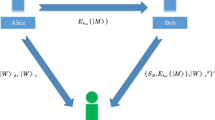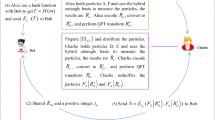Abstract
Inspired by the local indistinguishable of orthogonal product states, in our scheme, the classical message can be blinded by eight orthogonal product states which can avoid preparing higher-dimensional entangled states. And also inspired by the concept of quantum teleportation, our protocol can recover the original message via the five-particle entangled state sequence instead of transmitting the original message directly in the quantum channel. In this way, long distance communication can be realized between two communication participants and the probability of eavesdropping in the transmission channel is reduced. In addition, in the ideal quantum channel condition without noise, the security of the proposed scheme under some common eavesdropping attacks is validated.
Similar content being viewed by others
References
K. Tiliwalidi, J.Z. Zhang, S.C.A. Xie, Multi-bank E-payment protocol based on quantum proxy blind signature. Int. J. Theor. Phys. 58, 3510–3520 (2019)
X. Zhang, J.Z. Zhang, S.C. Xie, A secure quantum voting scheme based on quantum group blind signature. Int. J. Theor. Phys. 59, 719–729 (2020)
P.W. Shor, Polynomial-time algorithms for prime factorization and discrete logarithms on a quantum computer. SIAM J. Comput. 26, 1484–1509 (1997)
H.R. Wei, F.G. Deng, Scalable quantum computing based on stationary spin qubits in coupled quantum dots inside double-sided optical microcavities. Sci. Rep. 4, 7551 (2014)
D. Gottesman, I. Chuang, Quantum digital signatures. arXiv:quant-ph/0105032 (2001)
H.R. Li, M.X. Luo, D.Y. Peng, X.J. Wang, An arbitrated quantum signature scheme without entanglement. Commun. Theor. Phys. 68, 317–322 (2017)
X.-Y. Li, Y. Chang, S.-B. Zhang, J.-Q. Dai, T. Zheng, Quantum blind signature scheme based on quantum walk. Int. J. Theor. Phys. 59(7), 2059–2073 (2020)
H. Qin, W.K.S. Tang, R. Tso, Efficient quantum multi-proxy signature. Quantum Inf. Process. 18(2), 1–9 (2019)
D.H. Jiang, Y.L. Xu, G.B. Xu, Arbitrary quantum signature based on local indistinguishability of orthogonal product states. Int. J. Theor. Phys. 58(3), 1036–1045 (2019)
D.H. Jiang, Q.Z. Hu, X.Q. Liang, G.B. Xu, A novel quantum multi-signature protocol based on locally indistinguishable orthogonal product states. Quantum Inf. Process. 18(9), 1–14 (2019)
H. Chen, J.J. Shi, F. Zhou, J.J. Cheng, Quantum blind dual-signature scheme based on cluster states. IEEE International Conference. 978-1-0590-3028-6/17 (2017)
X.P. Lou, Z.G. Chen, Y. Guo, A weak quantum blind signature with entanglement permutation. Int. J. Theor. Phys. 54(9), 3283–3292 (2015)
Y.L. Wang, M.S. Li, Z.J. Zheng, S.M. Fei, Nonlocality of orthogonal product-basis quantum states. Phys. Rev. A 92, 032313 (2015)
Z.C. Zhang, F. Gao, Y. Cao, S.J. Qin, Q.Y. Wen, Local indistinguishability of orthogonal product states. Phys. Rev. A 93, 012314 (2016)
G.B. Xu, Q.Y. Wen, S.J. Qin, Y.H. Yang, F. Gao, Quantum nonlocality of multipartite orthogonal product states. Phys. Rev. A 93(3), 032341 (2016)
G.B. Xu, Y.H. Yang, Q.Y. Wen, S.J. Qin, F. Gao, Locally indistinguishable orthogonal product bases in arbitrary bipartite quantum system. Sci. Rep. 6, 31048 (2016)
T. Zheng, Y. Chang, S.-B. Zhang, Arbitrated quantum signature scheme with quantum teleportation by using two three-qubit GHZ states. Quantum Inf. Process. 19(5) (2020)
J. Walgate, L. Hardy, Nonlocality, asymmetry, and distinguishing bipartite states. Phy. Rev. Lett. 89, 147901 (2002)
G.B. Xu, Q.Y. Wen, F. Gao, S.J. Qin, H.J. Zuo, Local indistinguishability of multipartite orthogonal product bases. Quantum Inf. Process. 16, 276 (2017)
A. Cabello, Quantum key distribution in the Holevo limit. Phys. Rev. Lett. 85, 5635 (2000)
D.H. Jiang, X.J. Wang, G.B. Xu, J.Q. Lin, A denoising-decomposition model combining TV minimisation and fractional derivatives. East Asia J. Appl. Math. 8, 447–462 (2018)
S. Lin, G.D. Guo, Y.Z. Xu, Y. Sun, X.F. Liu, Cryptanalysis of quantum secret sharing with d-level single particles. Phys. Rev. A 93(6), 062343 (2016)
Y.F. He, W.P. Ma, Quantum key agreement protocols with four-qubit cluster states. Quantum Inf. Process. 14(9), 3483–3489 (2015)
K.J. Zhang, X. Zhang, H.Y. Jia, L. Zhang, A new n-party quantum secret sharing model based on multiparty entangled states. Quantum Inf. Process. 18(3), 81 (2019)
Author information
Authors and Affiliations
Corresponding author
Rights and permissions
About this article
Cite this article
Xia, C., Li, H. & Hu, J. A novel quantum blind signature protocol based on five-particle entangled state. Eur. Phys. J. Plus 136, 246 (2021). https://doi.org/10.1140/epjp/s13360-021-01234-0
Received:
Accepted:
Published:
DOI: https://doi.org/10.1140/epjp/s13360-021-01234-0




